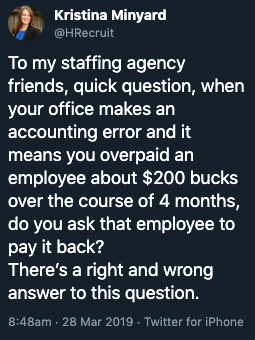So, an in the trenches Recruiting and HR Pro, Kristina Minyard (@HRrecruit on the Twitters) brought up a really great question last week, that had a pretty big response. Kind of a black and white response, meaning you either were in one camp or the other. (BTW – go connect with Kristina – she’s a passionate HR pro who puts a ton of time into being a great HR pro)
Here’s her question:

This really isn’t a staffing agency question, which Kristna knows, but this was the specific example, it’s a payroll and employee relations issue that happens at all organizations, big, small, public, private, etc. anytime there’s a payroll mistake.
What are the two sides?
Side 1 – It’s a company mistake, so the company should eat it.
Side 2 – It’s a mistake. It’s not the employee’s money. It should be paid back.
Which side do you fall on?
I’m guessing most of you would need more information. A situation like this needs details, right? Well, you don’t have any. You have the tweet, so what would your professional HR decision be?
What side did I take?
I’m fully and completely in the camp of – a mistake was made, the money should be paid back. Since this is my blog, I’ll lay out my argument!
1. By law, you can’t actually take the money out of an employees paycheck. The employee would have to sign an agreement, agreeing to have this money taken out of future checks in whatever payback schedule was agreed upon.
2. I look at this in a couple of ways. First, if the IRS overpaid you by $10,000 on your tax return, you would be legally obligated to pay back that money to the government, or you would be put in jail. BUT WAIT! It wasn’t my mistake! Yeah, so, you don’t get to keep the money it’s not yours! Second, if you underpaid an employee, do you think the employee would go, “it’s okay, I know it was a mistake, I’ll eat it’. No! Of course not, that’s ridiculous. So, why then should a company have to eat it? Because of a mistake?
3. It seems like the amount plays into this. Come on, Tim, we are only talking about $200 bucks! Just forget it about and move on. I have my SHRM-SCP and I’m 100% sure there was some stuff on the exam that talked about setting precedent. Precedent is a simple concept, although not always easy for employers to follow. It all boils down to this: what you do for one, you do for all. So, if payout this amount (to this white, male employee), but then we decide not to pay it out to another employee (a black, female) what do you think might happen? I’ll tell you in court.
4. So, if you agree with #3, you either have to pay it back every single time or never. Or, you need a payroll mistake policy that says, “if we make a payroll mistake less than $X dollars per week we will eat it, but any mistake over $X per week we will request repayment through a signed agreement”.
5. What if the employee refuses to pay back the mistake if the decision is made to request they pay it back? My answer? You fire them (this got me called “evil” – not by Kristina). Legally, if an employee is made aware they were mistakenly given money that isn’t there’s. Then they refuse to return it. You can fire them for cause, and because they were fired for cause you can without unemployment insurance benefits. Evil or not, that’s just the reality of the situation.
6. In a one-off situation, it seems ridiculous that you would ask for repayment and possibly go all the way to terminate this person for refusing to pay back the mistake. In an organization with hundreds and thousands of employees, where bigger mistakes, affecting more people, could be made, this seems very normal.
So, I’ll tell you I have had this exact situation happen many, many times in my career at organizations large to small, across many states, and never once have I had an employee refuse to pay back money that wasn’t really their money, to begin with. While it sucks, they understood. And part of that communication is letting them know, “this sucks, we’ve discovered a big mistake, and now we, together, have to figure out how to do what’s right”.
Kristina and I were on different sides of this. That doesn’t make her wrong and me right, or I’m right and she’s wrong. This is real HR. In HR, it’s our job to evaluate the risk of every situation an organization will face and advise on that risk. In Kristina’s analysis of this situation, she feels the risk is low and the employee shouldn’t have to pay back the mistake. In my experience, I feel it should be. Both, actually, could be the right answer, or the wrong answer. Welcome to the show, kids!
Okay, let me have it in the comments! What would you do in this situation?

